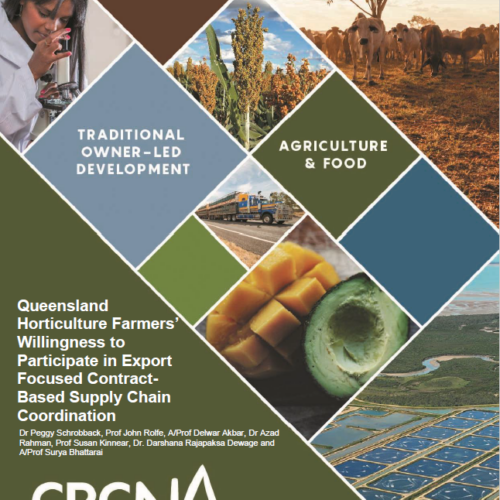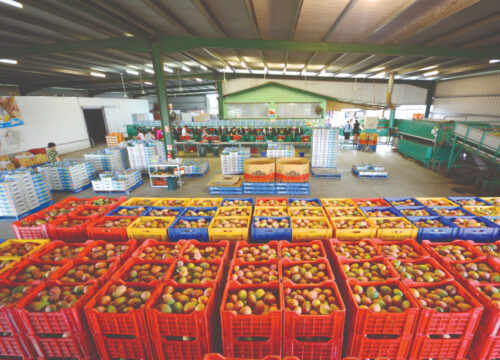
- Author Schrobback, P., Rolfe, J, Akbar, D., Rahman, A., Kinnear, S., Dewage, D. and Bhattarai, S.
- Publish date 20 May 2022
- Type Report
- ISBN 978-1-922437-36-5
- Documents
- Horticulture
- Strategic policy development
- Supply chain development
Summary
This study aims to investigate Queensland horticulture farmers’ willingness to participate in export-focused contract-based marketing agreements with downstream buyers as a form of closer vertical coordination. More specifically, this study aims to identify attributes of formal agreements that would encourage farmers’ participation, as well as enterprise and farmer characteristics which may explain their decision to seek closer vertical coordination with their product’s supply chain.
This study utilises a discrete choice experiment embedded within an online survey to understand farmers’ perceptions of export-focused contract-based supply chain coordination.
Based on the results of the study the following recommendations were derived:
- Queensland’s horticulture associations such as Growcom may consider identifying farmers who are not yet exporting their product but have an interest in doing so, particularly through marketing contracts with exporters. These farmers could be linked up with export agents to explore market opportunities including a potential individual export agreement.
- The horticulture industry could also consider exploring options to develop increased high-value supply chain collaborations within the domestic market. This could potentially also generate a higher production value for farmers. The horticulture industry may liaise with the retail sector to investigate potential options for streamlining supply chain coordination (e.g., contract farming). The experience gained from such an initiative could then be translated into the export supply chain.
- Industry networks (e.g., industry-buyer forums which offer both parties an opportunity to network and develop links) could be provided by the Government, such as Austrade or Trade and Investment Queensland, to facilitate business links and encourage the development of more coordinated vertical supply chain relationships. In addition, the provision of information and training about the potential benefits and costs of improved coordination for agribusinesses would support decision-making processes about options to create higher value for their product using a supply chain approach.
Projects
Exporting perishable commodities to Asia: Developing a stakeholder collaboration model
Coordination through the supply chain between growers, processors, marketers and transporters is the main impediment to exporting perishable commodities to Asian markets. Developing strong ties with those Asian markets is critical for expansion and development of perishable commodities in Northern Australia. This project examined stakeholder collaboration in planning and investment for exporting high value perishable agricultural commodities (HVPACs) from Northern Australia to Asian markets. Exploration was undertaken of multi-party collaborations in producing and processing perishable commodities, developing and enabling supply chain infrastructure as well as identifying policy and regulatory barriers to investment in this sector. The research approach combined a literature review, two stakeholder workshops, a farmer survey in Queensland, a consumer choice survey in China and spatial-modelling for volumes of HVPACs in CQ region. The stakeholder workshops examined the types and processes of collaboration suitable for HVPACs with regard to processing, investment and international trade mechanisms. In addition, technological innovation or adaptation, appropriate logistics and supply chain management were also examined. The final summary report outlines the five key objectives set for the project and aims to summarise all the finding and strategic recommendations with end user guidelines based on recommendations. This framework will be applicable to all regions within Northern Australia. Conference papers (published) Australia New Zealand Regional Science Associations International (ANZRSAI ) 2019. Cairns, Queensland, Australia. Rahman, A., Akbar, D., Rolfe, J.(2019). Every community wants an airfreight facility: is this a viable regional agricultural supply chain development option for central Queensland in Australia? Akbar, D., Rahman, A., Rolfe, J., Kinnear, S., Schrobback, P., Bhattarari, S. (2019). Working to grow together: horizontal collaboration for horticulture production in Queensland.


